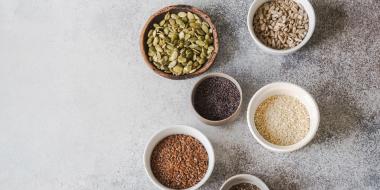Polycystic ovarian syndrome (PCOS) affects approximately 10 percent of menstruators in Canada. PCOS is linked to infertility, higher rates of miscarriage, gestational diabetes, and hypertension in pregnancy. For those who have been diagnosed with PCOS, concern over getting and staying pregnant can be overwhelming, but working closely with your healthcare provider and focusing on nutrition and lifestyle changes can vastly improve your chances of both conceiving and delivering a healthy baby.
For a PCOS diagnosis, patients must exhibit two out of three diagnostic criteria:
- Irregular cycles, lack of ovulation, or both
- Hyperandrogenism: Clinical signs of high male hormones and/or high levels of male hormones on bloodwork
- Polycystic ovaries: >10 follicles that are <10mm in size in one or both ovaries (and/or enlarged ovaries)
Signs, symptoms, manifestations, and associations seen in PCOS include:
- Irregular cycle
- Male-patterned hair loss/hirsutism
- Cystic acne
- Thyroid disorders
- Infertility
- High BMI/difficulty with weight management
- Acanthosis nigricans
- Vitamin D deficiency
- High stress levels
- Fatty liver
- Insulin resistance
- Mood disorders
- High inflammatory markers
- Polycystic ovaries
For more on PCOS visit ecoparent.ca/PCOS
There are many different pathways and mechanisms through which PCOS impacts fertility and pregnancy, with the accompanying risks dependent on its underlying causes as well as how well-managed it is. Once pregnant, those suffering from PCOS have increased risks of gestational diabetes, pregnancy-induced hypertension, preeclampsia, miscarriage, caesarean delivery, and preterm delivery compared to those without the diagnosis. The following list includes some of the contributing factors to infertility, higher miscarriage risk, and higher morbidity risk in PCOS:
Anovulatory cycle means your body isn’t releasing an egg, and therefore fertilization can’t take place.
Insulin resistance occurs when your cells become less responsive to the hormone insulin. High insulin levels are pro-inflammatory, pro-clotting, and hormone-disrupting, contributing to sex hormone imbalances, inflammation, and blood clotting. Insulin resistance significantly impacts fertility, since a developing baby relies on the development of the placenta and formation of new blood vessels. Further, high insulin levels are toxic to the trophoblast, which becomes a large part of the placenta.
Hyperandrogenism (high male hormones) and high insulin levels can lead to impaired placental formation, high inflammatory compounds, and mitochondrial dysfunction in the body.
Thyroid disorders can negatively affect your sex hormones, metabolism, and ability to get pregnant, as well as increase the risk of miscarriage.
HPA axis dysfunction is a disruption of the cooperative among the hypothalamus, pituitary, and adrenal glands, which is an integral part of the stress response. This can contribute to sex hormone changes, menstrual changes, thyroid function disruption, lifestyle changes, sleep disruption, and higher inflammation levels.
Vitamin D deficiency is associated with PCOS, and may impair conception and pregnancy outcomes. There are so many different reasons we need vitamin D adequacy – from blood sugar regulation and insulin sensitivity to hormone production and metabolism.
HOLISTIC HEALTH FOR PCOS
Unfortunately, while there is no one-size-fits-all solution to get to the root of your PCOS, the good news is that there are many methods, including a robust assessment, guidance, testing, effort, and of course, time, that will help pinpoint some of the causes of your diagnosis. I cannot stress enough how important it is to track your cycle and symptoms and to discuss your findings with your healthcare provider. Not enough focus is placed on the importance of tracking menstrual cycles and symptoms—all too often we don’t pay attention until conception is on the mind or if fertility struggles are present.
If you have PCOS and are considering conceiving or trying to get pregnant, I highly recommend a holistic approach to your health. From the foods you eat and your activity levels to any medications or assisted reproductive technology that may be prescribed by your healthcare provider, including a wide range of modalities will help improve your chances of conception and decrease the risk of pregnancy complications.
Conventional fertility and pregnancy support
If you aren’t ovulating, drugs like letrozole and clomiphene can be used to stimulate the ovaries and the release of eggs. Metformin, a medication commonly used for higher-than-normal BMI and/or insulin resistance, and diabetes, has also been shown to regulate menstrual cycles, increase pregnancy rates, and help decrease pregnancy complications. In either case, if you’ve been prescribed any medication or supplementation, it’s key that you discuss possible side effects and length of prescription.
However, just because you have PCOS doesn’t mean that you’ll be prescribed medications or require assisted reproductive technologies. Natural conception is still possible: it depends on what else is going on in your body and how well-managed your PCOS is!

Nutrition and lifestyle support
While dietary and lifestyle changes are usually recommended in conventional care, the unfortunate reality is that support is often not provided, and patients are often left to their own devices. However, these steps should be made a priority and be the first line of treatment. They are safe, effective, and sustainable ways to not only support your health now, but also decrease disease risk in the future! Focusing on nutrition and lifestyle changes also benefits your future babe—and what is more worthwhile than that?
Mind your meat Decreasing intake of saturated fats, which are found in high quantities in red meats, can help decrease inflammation levels and also help improve insulin sensitivity.
Fibre-full Increasing fibre intake through the addition of plant-based foods like fruits, vegetables, whole grains, nuts, and seeds is helpful for hormonal metabolism.
Fuel up! Under-fuelling and over-fuelling both impact the release of our hormones, so ensuring adequacy and diversity of energy is important. Caloric adequacy looks different for different people.
Berry-rich Incorporate foods high in antioxidants and folate, like berries and leafy greens.
Reign in refined foods Avoid foods and drinks that spike blood sugar and insulin levels, like refined sugar, and processed foods like candy, soda, and baked goods.
Ditch dairy If you experience acne and/or digestive issues, dairy could be to blame. Dairy can increase androgenic acne and contribute to digestive disturbances. Try eliminating dairy for a few weeks and see if that improves those symptoms.
In balance Focus on meals that have lean protein, fibre, and fat so that your blood sugar stays regulated.
Make gains It’s cliché to say, but there really is no replacement for exercise. Do you what you can (walking, weights, dancing, sports, swimming, yoga, etc.), as activity is important for healthy metabolism, detoxification processes, blood sugar regulation, healthy body composition, and circulation.
Scale down Weight management can be helpful in restoring periods, however, it’s not the be-all-end-all. The reason why weight is difficult to shift in PCOS is because there’s metabolic dysfunction and it likely took a long time to get to that state. Slow changes in other areas like nutrition, sleep, and activity can be really helpful here when you have some guidance. And there are meds that can help here as well.
Pin it Acupuncture can be helpful to help not only with menstrual regulation but also as an adjunct to assisted reproductive technologies.
Catch zzz’s Focus on getting restful sleep. It’s important for your hormones, for decreasing inflammation levels, and just for overall wellbeing!
Shop smart Avoid endocrine disruptors like BPA, phthalates, triclosan, and parabens found in plastics, cleaning products, and personal care products to minimize hormonal disruption that these chemicals can introduce.
Stress less Not only does stress dysregulate our hormones but negatively impacts our lives. Finding ways to manage stress, making sure to implement self-care, and scheduling in time for adequate rest and recovery are key. Community and support groups can be helpful here too.
Supplemental support
Consult with your healthcare provider before taking supplements and herbs, especially if you’re trying to conceive and/or also taking medications. While not exhaustive, the following list of supplements and herbs can be helpful for PCOS and fertility:
- Inositol for blood sugar control, improving cycle regularity, and egg quality
- Black cohosh and chaste tree can help support healthy estrogen and progesterone levels
- Iron, B12, vitamin D, iodine, selenium, ashwagandha, zinc, and coleus can support thyroid function
- B vitamins, vitamin C, magnesium, and herbs like rhodiola, ashwagandha, peony, schisandra, and cordyceps may be useful for adrenal support
- Spearmint tea is a great pick-me-up that can help decrease excessive hair growth
- Vitamin D
- Melatonin can improve endometrial receptivity and is a useful antioxidant
- N-acetylcysteine (NAC) can help improve insulin receptor sensitivity, decrease inflammation, and regulate ovulation
- Antioxidants like alpha lipoic acid, NAC, and coQ10 can help with overall inflammation, egg quality, healthy embryo development, and offer mitochondrial support
- Cinnamon can help improve insulin sensitivity
For more tips on treating PCOS naturally visit ecoparent.ca/natural-PCOS
PCOS is a multifaceted syndrome and your treatment will depend on your medical history, family history, symptomology, and testing. Addressing PCOS early can be helpful for your fertility and pregnancy journey, and if you’re newly diagnosed or having issues, creating a healthcare team who will support you, your needs, and your health is key.
You may also enjoy: Trying to Conceive: Fertility Tips You Need to Know, Hormone Myths of the Menstruating Woman, and Fertility Foods to Rev-up Your Reproductive Power.






